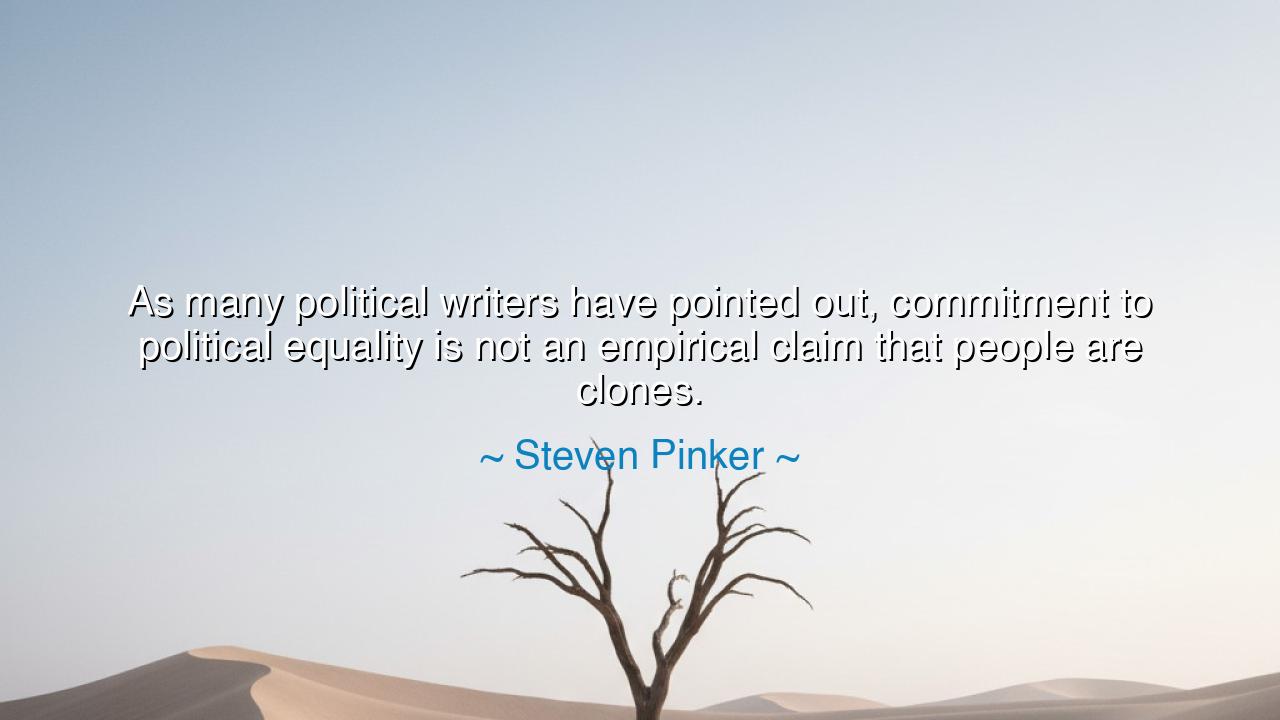
As many political writers have pointed out, commitment to
As many political writers have pointed out, commitment to political equality is not an empirical claim that people are clones.






In the grand halls of history, where the voices of those who shaped our world echo, we find that the journey toward political equality has always been fraught with struggle, not just against external forces, but within the very hearts of those who seek justice. The wise and learned Steven Pinker, a philosopher of our time, offers a profound observation: "As many political writers have pointed out, commitment to political equality is not an empirical claim that people are clones." In this statement, he reveals the essential truth that the pursuit of equality does not demand the erasure of individuality, nor does it insist that all people be made the same. Rather, it is the recognition that all, regardless of their differences, deserve the same rights, the same dignity, and the same opportunity to flourish.
At first glance, the word equality may seem to suggest that all men and women should be uniform, that the rich and the poor, the strong and the weak, should be indistinguishable in all respects. But true equality is not the denial of diversity; it is the celebration of it. The great political thinkers of the past, from the sages of ancient Greece to the philosophers of the Enlightenment, have always understood that to be equal is not to be the same. It is to be treated the same, regardless of the differences that make each person unique. To insist on equality is to insist that every soul—no matter their station, their background, or their gifts—deserves the same freedom and the same rights as any other.
The empirical claim Pinker refers to—the idea that people should be clones—is a misunderstanding of the true nature of political equality. We are not mere copies of one another; we are beings of great complexity and individuality. Consider the ancient philosophers who sought to understand the human condition. Plato, in his ideal state, recognized that people must be treated equally before the law, yet he acknowledged that each person has their own role to play in society—some are meant to be rulers, others soldiers, others farmers. The roles were different, but the treatment was equal. True equality lies not in making everyone the same, but in ensuring that all are given the opportunity to fulfill their unique potential.
Look upon the story of Nelson Mandela, a man who, though imprisoned for 27 years, never abandoned his commitment to the equality of all people. In the apartheid system, black South Africans were seen as less than equal to whites, forced to live in a world that denied them their basic rights and dignity. But Mandela understood, as did the great thinkers before him, that the fight for equality was not the fight for sameness, but for the recognition of each person’s inherent worth. He did not demand that black South Africans become clones of their white oppressors; rather, he sought a society where everyone could live as equals, where the law treated each person with the same respect, regardless of the color of their skin or their social class.
This is the lesson we must take from Pinker’s words. Equality is not the denial of individuality, but the affirmation of it. The political world must not seek to make us all the same—this would be the great destruction of the diversity that makes humanity so rich—but it must ensure that the differences we carry do not dictate our rights. To commit to political equality is to commit to a world where each person is free to live their life as they choose, without the constraints of unjust laws or societal structures that favor one group over another. It is a call for a society where each individual is given the tools to succeed, the opportunity to flourish, and the dignity to be recognized as equal in the eyes of the law.
Thus, let us take these words to heart: as we move forward in our own struggles for justice and equality, let us remember that we are not striving for a world of sameness, but a world where each person, regardless of their background or their abilities, is given the same opportunity to achieve their dreams. The richness of humanity lies in its diversity—in the different skills, talents, and perspectives each person brings to the table. And in the pursuit of equality, we must not seek to erase these differences but to ensure that each difference is honored and respected, and that all are given the freedom to live as they choose.
In our own lives, let us celebrate the differences that make us unique. Let us not look for ways to make others conform to our image, but instead seek to build a society where each person, no matter their station or background, is given the freedom to flourish. We must advocate for laws that treat all people with the same respect and dignity, and we must cultivate a culture that values not sameness, but the richness of human diversity. For in the end, true equality is not found in the uniformity of our lives, but in the recognition of our shared humanity and the respect for the freedom to live as we choose.






AAdministratorAdministrator
Welcome, honored guests. Please leave a comment, we will respond soon